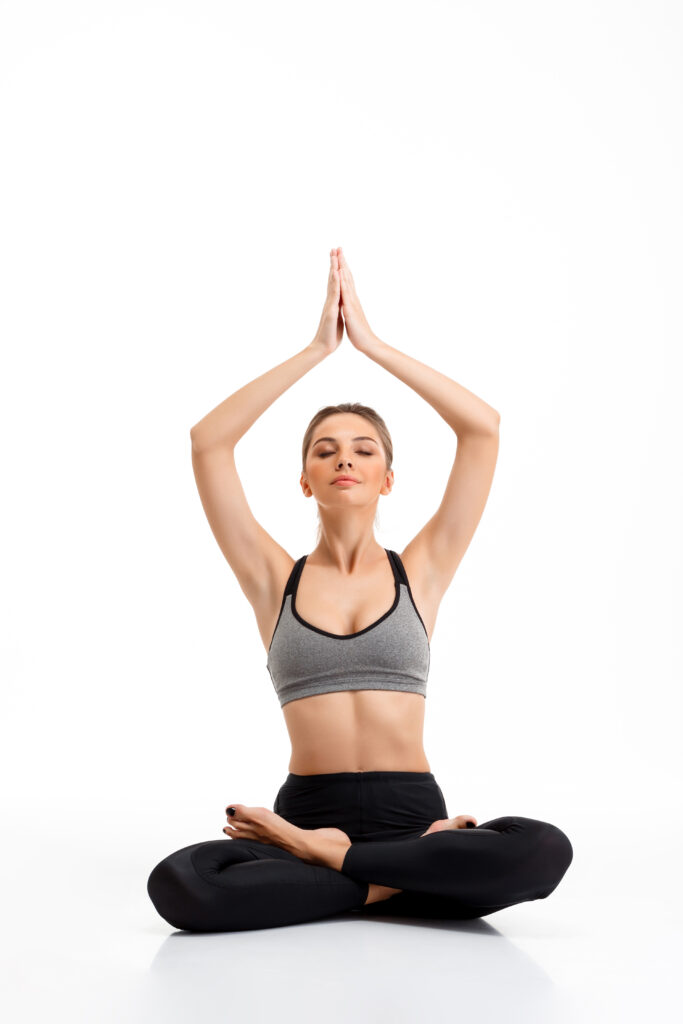
In the fast-paced world of today, stress and bad lifestyle choices are practically inevitable. Burnout, bad eating, digital distractions, and inconsistent sleep patterns are just a few of the ways that modern life may leave you feeling worn out and disengaged. However, yoga is a straightforward, age-old practice that provides a comprehensive answer.
Yoga is more than simply physical activity; it’s a comprehensive method to help your body and mind become more balanced, strong, and peaceful. You can enhance your general sense of wellbeing, develop better habits, and manage stress more skillfully with regular practice. Let’s investigate how.
1. Yoga Helps Build Better Daily Habits
Being mindful brings about awareness
The practice of mindfulness, or being in the present moment, is one of the fundamental tenets of yoga. You start to become more aware of your thoughts and feelings when you learn to concentrate on your breathing or posture. Being self-aware is essential for spotting harmful tendencies and implementing deliberate adjustments.
You may identify when you are emotionally eating or doom-scrolling on your phone, for instance, by engaging in mindfulness exercises on the mat. Yoga gradually teaches your mind to stop, think, and make better decisions.
Routine-Based Discipline
Consistency is encouraged by yoga. It becomes a constructive routine that grounds your day, whether you practice before bed, after work, or in the morning. Other facets of life, such as getting up earlier, eating more deliberately, or scheduling self-care, can benefit from this discipline.
Many people discover that doing yoga first thing in the morning helps them make healthier choices all day long. It’s similar to establishing a calm and purposeful tone.
Improved Sleep, Of Course
You perform better when you get more sleep. By calming the nervous system and clearing the mind, yoga has been demonstrated to enhance the quality of sleep. Gentle evening stretches or Yoga Nidra are two techniques that help you relax and get ready for a good night’s sleep, which is a vital habit for your health and vitality.
2. Yoga Lowers Anxiety and Stress
Release of Tension Physically
One of the first things you notice when doing yoga is the amount of tension you’ve been carrying around in your body, such as a stiff back, a clenched jaw, or tight shoulders. Asanas, or yoga poses, aid in releasing this pent-up tension.
Your body’s “rest and digest” mode, the parasympathetic nervous system, is triggered by deep breathing and stretching. This lowers blood pressure, lowers heart rate, and reduces anxiety.
Control of Breath (Pranayama)
Yoga incorporates pranayama, or breathing exercises, which are effective mental-calming methods. Techniques like box breathing and alternating nostril breathing (Nadi Shodhana) can rapidly lower stress and increase attention.
In addition to increasing oxygen flow, controlled breathing helps you relax and sends a safety signal to your brain. Even at your desk or during a difficult time, you can practice this.
Emotional Resilience
Yoga helps you to sit with physical and mental discomfort if you practice it regularly. You learn to observe stressors objectively rather than responding to them on the spur of the moment. By increasing your emotional resilience, you become less reactive to everyday annoyances and better equipped to face difficulties head-on.
3. Yoga Boosts Overall Well-being and Mood
Feel-Good Hormones Are Released
Yoga increases endorphins, the body’s natural mood enhancers, just like other types of exercise. However, in contrast to strenuous exercise, yoga also releases GABA (gamma-aminobutyric acid), a neurotransmitter associated with lowered anxiety and elevated mood.
Most individuals report feeling lighter, more energized, and happier after a successful yoga session. That “yoga glow” and inner serenity are genuine!
Improves Self-Love and Body Image
Yoga promotes self-acceptance, in contrast to many fitness regimens that emphasize looks. Respecting where you are right now is more important than your strength or flexibility.
This change in viewpoint promotes a good body image and lessens negative self-talk. Yoga gradually promotes a more loving, caring relationship with oneself.
Promotes Appreciation
Many yoga classes conclude with introspection during meditation or savasana, or final relaxation. This peaceful time frequently fosters thankfulness, a strong feeling that improves contentment and mental health in general.
Your entire perspective can change just by taking a moment to enjoy your body, your breath, or a brief moment of calm.
4. How to Start a Yoga Practice
Begin Small and Stay Consistent
You are not need to dedicate an hour each day. Begin with simply 10 to 15 minutes each day, even if it’s only a few light stretches or deep breathing. Consistency is crucial.
Beginner-friendly courses that work with any schedule can be found on apps like Yoga with Adriene, Daily Yoga, or Sarva (located in India).
Select a Look That Works for You
yoga comes in a variety of forms:
Hatha Yoga: Gentle and slow, ideal for newcomers.
Vinyasa: Flowing movements that connect movement and breath.
Yin Yoga: Long holds and deep stretches are great ways to unwind.
Power yoga, often known as Ashtanga, is intense and builds strength.
Supportive poses with props are ideal for relieving stress in restorative yoga.
Choose a style that suits your objectives and level of enthusiasm.
Set the Right Environment
Lay out your mat, light a candle, turn on some relaxing music, or simply shut your door to create a peaceful environment. It aids in letting your mind know that you need to be present and at peace right now.
conclusion
Yoga is not a panacea. You can reconnect with your breath, your body, your thoughts, and your inner calm with the support of this lifelong partner. Yoga offers a way to achieve your goals, whether they be to feel better, develop healthier habits, or lessen stress.
“Yoga is a light, which once lit, will never dim,” as B.K.S. Iyengar once remarked. The flame will burn brighter the better you practice.
So take a deep breath, spread out your mat, and start on the path to a happier, healthier, and more peaceful version of yourself.